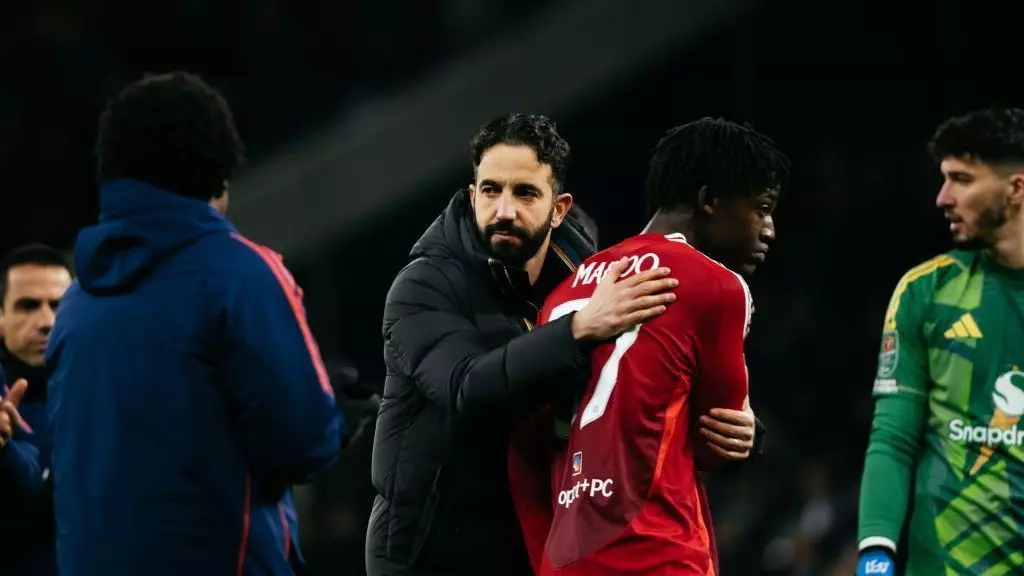In the realm of high-level football management, decisions regarding player selection often become the focal point of intense scrutiny, particularly when the outcomes fall short of expectations. This was recently illustrated by Ruben Amorim’s decision to exclude Marcus Rashford from Manchester United’s lineup for consecutive matches, including a heart-stopping 4-3 defeat to Tottenham Hotspur in the Carabao Cup quarterfinals. Despite the fallout and the emotional weight of such choices, Amorim firmly stood by his decision, proclaiming it to be in the team’s best interest. This article delves into the implications of those selections, the roles of both player and manager, and the broader ramifications for a club like Manchester United.
Rashford, a player of significant caliber and a fan-favorite, found himself sidelined two games in a row, stirring intrigue and speculation regarding the reasons behind his omission. While performing admirably for Manchester United in previous seasons, the 27-year-old forward’s recent statements indicated a desire to seek opportunities elsewhere, casting a shadow over his commitment to the club at this critical juncture. The question arises: was Amorim’s decision primarily tactical, or did it stem from deeper issues concerning Rashford’s mindset and performance?
Amorim seems to suggest a tactical rationale, emphasizing that every decision boils down to what he believes serves the team’s strategy most effectively. In football, motivation and morale can indeed fluctuate, and a steady hand at the helm is crucial when managing egos and expectations. Nonetheless, one cannot dismiss the chance that Rashford’s aspirations might have influenced the overall atmosphere within the squad. The complex interplay of tactical needs and the player’s mindset leads to challenging decisions, illuminating the intricate nature of team dynamics.
The match against Tottenham encapsulated the ups and downs of football—where victory can be snatched away in moments, often due to critical errors from key players. The impact of goalkeeper performances cannot be overstated in such situations. Altay Bayindir, stepping in as the second-choice goalkeeper, bore the brunt of two unfortunate mistakes. However, Fraser Forster’s glaring errors for Spurs were equally notable, the second occurring from a back pass that was promptly charged down by Amad Diallo.
Such blunders naturally build up pressure both on the players directly involved and on the coaching staff. Amorim’s decisions regarding squad selection, particularly in goalkeeping scenarios, highlight an ongoing search for stability within the team. While a manager may be confronted with the need to instill confidence in his players, he also must grapple with the consequences of their performances on the pitch. The fact that errors can define the fate of matches underscores the relentless nature of football and the razor-thin margins that can lead to elimination from a competition.
Despite the disappointment of exiting the Carabao Cup, Manchester United’s season is far from over. For Amorim, the focus must now shift to recovery and re-strategizing for upcoming fixtures, including crucial league games. The club’s eye remains on potential silverware, whether in domestic or European competitions. Similarly, Rashford’s future looms large; whether he can re-establish his standing in the squad or whether his ambitions will take him to greener pastures remains to be seen.
Moreover, as Tottenham prepares to face Liverpool in the semifinal, alongside Arsenal taking on Newcastle, the competitive landscape continues to shift. The stakes have never been higher, compelling managers not only to optimize their selections but to manage player sentiments effectively. The road ahead promises challenges, opportunities for redemption, and critical lessons for Amorim and his squad.
Ruben Amorim’s decision to leave Marcus Rashford out of crucial games raises questions about managerial courage, player dynamics, and the broader implications of club management. As United seeks to bounce back from a painful cup exit, it’s a reminder of the harsh realities of professional football, where perseverance, resilience, and strategic acumen will be pivotal for success in an ever-demanding atmosphere. Whether Rashford finds a way back or embarks on a new journey, the unfolding story will continue to captivate fans and analysts alike, epitomizing the beautiful game’s inherent drama.

